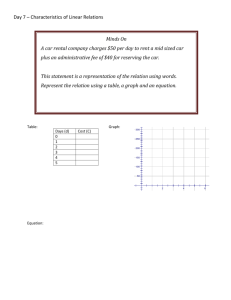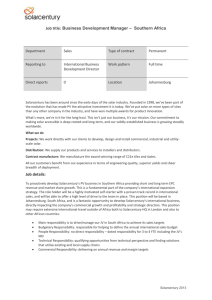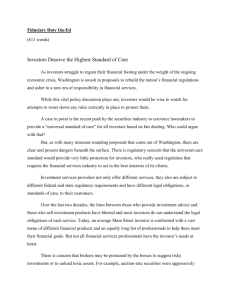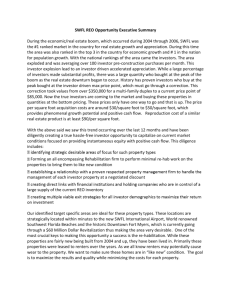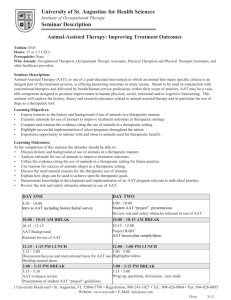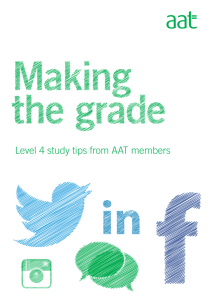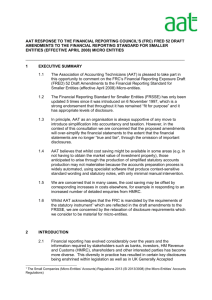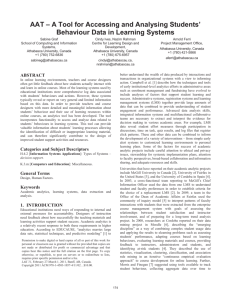REGISTRATION OF COMPANY CHARGES
advertisement
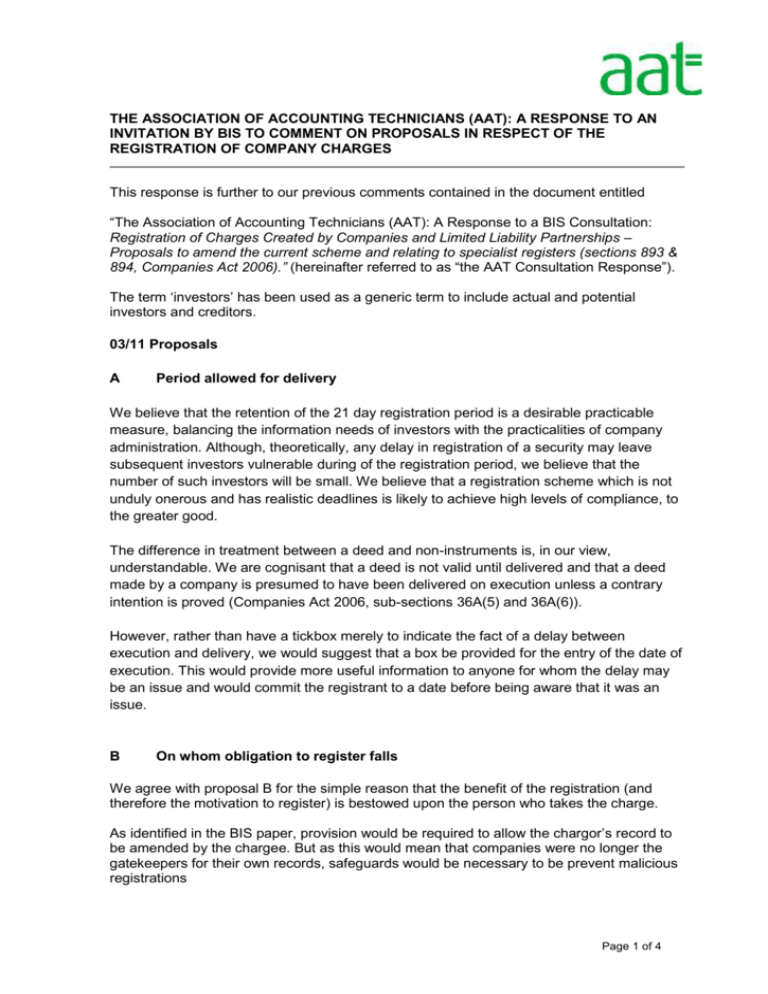
THE ASSOCIATION OF ACCOUNTING TECHNICIANS (AAT): A RESPONSE TO AN INVITATION BY BIS TO COMMENT ON PROPOSALS IN RESPECT OF THE REGISTRATION OF COMPANY CHARGES This response is further to our previous comments contained in the document entitled “The Association of Accounting Technicians (AAT): A Response to a BIS Consultation: Registration of Charges Created by Companies and Limited Liability Partnerships – Proposals to amend the current scheme and relating to specialist registers (sections 893 & 894, Companies Act 2006).” (hereinafter referred to as “the AAT Consultation Response”). The term ‘investors’ has been used as a generic term to include actual and potential investors and creditors. 03/11 Proposals A Period allowed for delivery We believe that the retention of the 21 day registration period is a desirable practicable measure, balancing the information needs of investors with the practicalities of company administration. Although, theoretically, any delay in registration of a security may leave subsequent investors vulnerable during of the registration period, we believe that the number of such investors will be small. We believe that a registration scheme which is not unduly onerous and has realistic deadlines is likely to achieve high levels of compliance, to the greater good. The difference in treatment between a deed and non-instruments is, in our view, understandable. We are cognisant that a deed is not valid until delivered and that a deed made by a company is presumed to have been delivered on execution unless a contrary intention is proved (Companies Act 2006, sub-sections 36A(5) and 36A(6)). However, rather than have a tickbox merely to indicate the fact of a delay between execution and delivery, we would suggest that a box be provided for the entry of the date of execution. This would provide more useful information to anyone for whom the delay may be an issue and would commit the registrant to a date before being aware that it was an issue. B On whom obligation to register falls We agree with proposal B for the simple reason that the benefit of the registration (and therefore the motivation to register) is bestowed upon the person who takes the charge. As identified in the BIS paper, provision would be required to allow the chargor’s record to be amended by the chargee. But as this would mean that companies were no longer the gatekeepers for their own records, safeguards would be necessary to be prevent malicious registrations Page 1 of 4 C Trustees Whether companies holding charges in trust should be identified as such is a very difficult question. On the one hand, as a general principle, we regard openness as desirable. On the other hand, we are cognisant of commercial reality. The special purchase vehicle (SPV) is a common device to protect the confidentiality of the actual investor. There may be genuine reasons for this, such as to avoid being targeted by pressure groups. While, of course, it is of the utmost importance that the existence of a charge is apparent on the face of the record, on balance, we believe that there are genuine reasons for the protection of confidentiality in commerce and that to require disclosure may stifle investment. D Registrable and non-registrable charges We have nothing to add to our views previously expressed in paragraphs 6 to 9 of the AAT Consultation Response. In short, we support the proposal. E Charges over acquired property In our view, a charge over acquired property should be required to be registered against the acquiring company’s record at Companies House. The acquired property is an asset of the acquiring company and a charge over it, as with other assets, can be considered by investors as an indicator of financial strength. The lack of registration against the acquiring company’s record at Companies House could lead an investor (who would not necessarily be able to distinguish between pre-existing and acquired property) to assume that there is no such charge and, therefore, that the company is in a stronger financial position than it actually is. We appreciate that the motivation behind the proposal is to reduce the regulatory and administrative burden upon companies. However, we believe that the practical effect of the proposal will be counter to this laudable aim because: compliance with the proposal would be dependent upon an infallible corporate memory. If a charge is not registered on acquisition, company administrators, who might not themselves know of or remember the charge, could sell or further charge the property without first registering the charge at Companies House; there could be a delay between the investor checking the Company House record and the registration by the company of the pre-existing charge. Although the company would have complied with the proposal, the investor would not have been protected by it. Page 2 of 4 F Constructive notice We fully support the proposal in relation to the principle of constructive notice. However, we think that constructive notice from the day following the appearance on the public register may work harshly against the interests of investors, Due diligence is often done as far ahead of a transaction as possible. Although good practise requires the register to be checked again before execution of the transaction, this final check might not be done on the same day of the transaction but two or three days before. Any change to the register could, therefore be missed. We believe that constructive notice should be from 14 days from a charge appearing on the register. G Rectification of register We believe that Proposal G is sensible and uncontroversial. H Floating charge issues We believe that Proposal H is sensible and uncontroversial. In this regard a tickbox is adequate to convey the information required. I The charge instrument We support the proposal because: J currently, the amount of information recorded can vary widely. Access to a certified copy of an instrument would introduce consistency to the amount and usefulness of information available; the filing of standardised information in the absence of an instrument would be useful for the same reason. Requirement for brief particulars We would suggest that the brief particulars should also include a prominent date of expiry of the charge if the charge may expire by the effluxion of time. An example of such a charge would be a charge to secure the recovery of funds provided to promote sports in the event that there is a change of use of land within 10 years. This is far from a unique example, and such charges can remain on the register long after expiry without notice of satisfaction. Page 3 of 4 In relation to: (b), we believe that the record of the existence of a charge is sufficient and that the requirement to reveal a trust could inhibit investment; (c), we believe that the actual date of execution would be more useful that a tick box verifying the mere fact of a delay between execution and delivery; We agree that the other provisions proposed in J are adequately dealt with by way of tick box. K Register of Charges Our views expressed in the AAT Consultation Response are unaltered. L Overseas companies We support Proposal L without amendment. David Simpson, barrister 13 May 2011 Page 4 of 4

